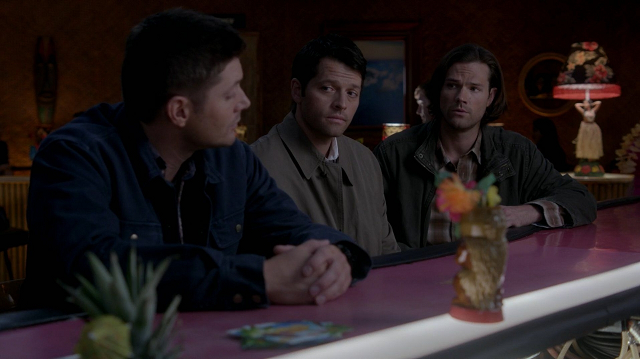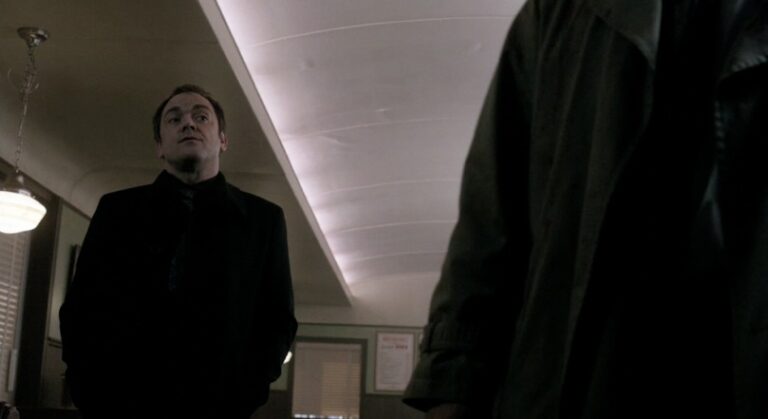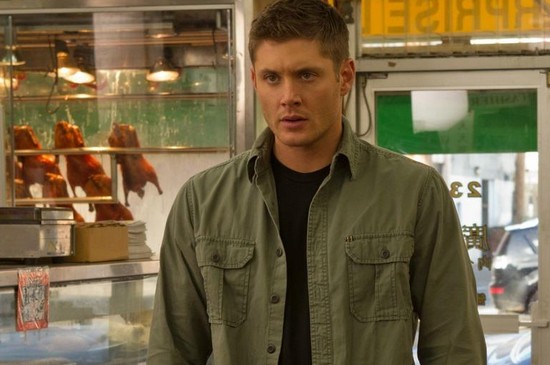Supernatural Family Dynamics
I’m proud to share another article from another new guest. Mae sent me a great piece called “Supernatural’s Family Dynamics.” She’s a psych student, so it comes with citations. This can also be found on her livejournal, http://maebandy.livejournal.com/. As usual with guest posters, if you feel like sharing, do not repost. Share the link to here or to Mae’s livejournal.
—————————–
In a nation in which the individual’s work week is ever increasing in hours, it is hardly surprising that incidences of workaholism seem to have risen and have become a normal and sometimes even praised employee characteristic. However, when examining the effects of workaholism on a family system, the phenomenon has been closely related to that of the effects of alcoholism on family systems by John Bradshaw. He suggests that abandonment by a parent, whether physical or emotional, is enough to influence family dynamics and states that workaholism can have the same effects as alcoholism on the roles each family member plays within the family system (Bradshaw, 1988). An excellent example of parental workaholism’s effect on a family system is demonstrated on the television show Supernatural. On the show, Dean and Sam, the sons of a workaholic father, are flashed back to during their youth, but are mostly depicted during their struggle to mature from young adulthood, in which they are defined by dysfunctional family roles, into adulthood.
In previous research, workaholism has been identified as “a progressive, fatal disorder in which a person is addicted to the process of working, the result of which leads to family disintegration and increased unmanageableness of work habits and all other areas of life” (Robinson, 1996, p. 447). This definition appears to completely embody the character of John Winchester, the patriarch of the Winchester family. Though John’s work is somewhat different than the average citizens in that his job is hunting malevolent supernatural beings, he does share the average citizen’s common aspect of dedicating too much of himself to his work. Such dedication however, comes at price of emotionally abandoning his children, sometimes physically leaving the Dean and Sam on their own for such long stretches of time that it could almost be considered neglect.
Like many parents who suffer from workaholism, John loves his children but finds himself compelled to spend all his waking moments either working or thinking about work, leaving little time to nurture and raise his children. Prior research by Pietropinto has found that in a workaholic family, “children become [an] extension of work and career and the workaholic’s ego, molding their lives around interests and values of workaholics” (as cited in Robinson, 2001). In order to find a balance between his need to work and his wish to raise his children, John compromises by bringing his children on Hunts when he feels they are old enough. This compromise allows him to nurture his children by teaching them the skills they will need to be Hunters as well as modeling the more negative skills of hustling pool, credit card scams and impersonating various persons of the law.
Though he has found a method by which to nurture and give attention to his children, John’s military background and workaholic tendencies bleed into the lessons and he interacts with the boys by barking orders at them and expecting perfection in every task. It appears that, though he might have been physically present during the boys’ childhood, he was mostly emotionally absent, which Bradshaw describes as a shared characteristic of families afflicted with alcoholism or workaholism (Bradshaw, 1988). Bradshaw also explains how, when addiction is introduced into the family unit, the natural role for each family member becomes more of a ball and chain and has more negative effects on the individual’s developmental growth.
However, in order to more fully understand the concept of roles for each family member, one must examine Alfred Adler’s (Adler, 1928) theory of family constellation. Alder suggested that birth order was important to the formation of a child’s personality and that being the first born would have a different affect on an individual than being a second born as the second born would need to assume a different role than the first born had already embodied. Examining the relationship between birth order and individuals in a family with addiction, Bradshaw takes the family constellation concept one step further and describes how addiction in a parent can negatively influence children to embrace the role as a static trait defining the child’s personality rather than a dynamic trait of the child’s persona.
First Born
As the first born of the Winchester family, prior to the loss of his mother, Dean would conceivably have fit the role of the family hero; however, any speculation as to how Dean’s personality would have developed had his mother lived and his father not become a workaholic can only be indulged by watching second season’s What Is and What Should Never Be. In this episode Dean is shown what life would have been like had his mother not died. In this altered reality, he would have become owner of his father’s car repair business, thereby still living up to his father’s expectations by taking over the family business.
However, in Supernatural’s reality, Mary died in such a manner that made John Winchester both a workaholic in the pursuit of his wife’s murderer and a single father attempting to raise his two young children. As the oldest, Dean fulfilled the role of the family hero by vainly attempting to be the perfect son to an inattentive father and successfully shouldered the responsibilities of the family caretaker by essentially raising his younger brother, Sam, and providing unwavering support for his father.
In order to have a relationship with his workaholic father, Dean found that he had to follow all orders to the letter or risk becoming a disappointment. This phenomenon was actually demonstrated in Season 1’s Something Wicked This Way Comes when, after being caught disobeying John’s order to babysit Sam while John went out Hunting. Dean states that, “[Dad] looked at me differently after that.” It appears that this single act of disappointing his father was enough to spur Dean on to never deviate from his father’s orders for the next ten years. Many oldest children of workaholic and alcoholic families find themselves taking on parental roles for their younger siblings (Bradshaw, 1988). During his father’s absence, Dean is expected to supply Sam with his basic needs for food and shelter, albeit monetarily provided for by their father, as well as fulfilling Sam’s need for love and belonging by being both his brother and surrogate father. In order to gain any attention or possible affection from his father, Dean must act as “a good little soldier,” follow orders and not ask questions.
Because Dean’s role required him to live his life based on orders, he has difficulty being an independent thinker even well into adulthood. When John goes missing and Dean is suddenly left without orders, his first impulse is to find his younger brother. By recruiting his brother’s help to find their father, Dean hopes to, not only gain direction, but also regain the familiar role of caretaker for his brother. When John begins doling out orders via texts and phone calls to his sons, Dean immediately reverts back to following his father’s orders while still being mindful of his brother’s safety. Though the brothers no longer solely search for their father, Dean is content to live a life in which he can follow his father’s orders and act as guardian to his younger brother as this is role in which he was raised.
Second Born
According to Bradshaw, second children typically embody and display the underlying emotions of the family unit. A more accurate depiction of Sam’s role within this dysfunctional family could only be created by adding that, because the first born has already taken the role of family hero, the second child is then left with being both the rebel and scapegoat.
While, by following his father’s example, it appears to Dean that Hunting is the only important thing in life, Sam, even from a young age, intuits that something is missing in the Winchesters’ lives and that Hunting cannot be life encompassing. Growing up, Sam learns to hide the majority of his own emotions as they conflict with his father’s (and, in copycat fashion, his brother’s) insistence that there is nothing more important than the Hunt. Though this bottling of emotions serves him well as a child, as a young adult, it morphs into keeping secrets from loved ones (such as not telling his now deceased fiancée about being a Hunter) and withholding information which might be self-incriminating (such as not telling Dean about his demon blood addiction).
Unsure of how to relate to his father without treading on or competing with Dean’s role as family hero, Sam naturally becomes the family rebel in order to gain that coveted attention from his father. In the majority of families, this role is usually accompanied by poor marks in school, trouble with authority, difficulty relating emotionally to peers and running away; however, as the Winchester family strays somewhat from the norm, Dean, the family hero actually displays the first three characteristics which are either ignored (poor marks) or endorsed (trouble with authority) by his father. Sam displays rebellion within the Winchester family by being intelligent in aspects other than Hunting, questioning whether his father is all-knowing and eventually “running away” to go to college rather than remaining a Hunter.
Though both Sam and Dean have begun to shed their familial roles and are maturing into being independent adults, they have only managed to do so by confronting these roles head on. By continually examining their initial impulses to action, they can determine whether those impulses are born out of simple role reaction or derived from logical deduction. And hey, maybe they’ll save the world while they’re at it.





Wow this article is fascinating…it really makes you think about how much john’s presence shaped the boys and how much they’re still falling into/rebelling against those roles. it really makes you think…. i just know i’m now going to be thinking about this and family dynamics all day
Honestly, I’ve been trying to find any excuse to weave Supernatural into any of my assignments since I entered college. But I haven’t had a chance.
So Mae, that makes me love this article more than I already do. It’s a very interesting analysis, especially since I never put much thought into the ways John still influences them, even after his death. (btw, mind if I friend you on LJ?)
Hi, Mae,
Great article! I love reading anyone’s take on the how’s and why’s of the emotional formation of the boys and while I have no formal knowledge such as you’ve included in here with your notes, I am easily able to follow your thought process and analysis.
It is a credit to the writers that they’ve created such rich complex characters and thus give us such joy in analyzing them…you did an excellent job.
I love to see how Sam and Dean continue to be affected and/or driven by John even as he has long since (physically) left the scene…he’s still there pulsing beneath much of what we see.
Thanks for sharing.
I am fascinated by idea that for Sam, rebelling involved getting a scholarship to college and being a good student. Dean, the theoretical golden child, got that way by embracing a lifestyle that by societies standards is wrong.
What wonderful article. It really gives you a better understanding of why the brothers are they way they are. It also got me thinking about John and why he had become the “workaholic’. I think it was more than just obsession to seek revenge for Mary’s death.
John had served in Viet Nam (I’m assuming it was, due to the time period) and with his soldier training, he would have been taught when you’re handed a mission, you must complete that mission or die trying.
I believe in John’s mind with all his training and experience, this was a mission and to fail was not an option.
Wonderful article, Mae. Great citations and thoroughly comprehensive.
Karen, I wonder about John, too. I like to think that John’s workalcoholic nature is a result of his grief, since we always see him wearing his wedding ring even twenty-two years after Mary’s death. His driven determination could also be his way of grieving, by burying his emotions and pursuing with single-minded resolution a lifestyle that makes all right with the world. He lost his wife in a way that does not make any damn sense; once he went to see Missouri and learned the truth, John did only what he thought he could do: hunt the things that haunt the darkness and, at the same time, hunt down the thing that killed his wife.
Now, whether John was truly thinking about his sons … debatable. A parent’s role in life (I like to believe) is to prepare their child(ren) for the world they are going to face. John did that by training the boys as hunters, preparing them for a dark world filled with evil, dangers, and death. Conversely, John’s actions truly center on Mary and her death. If she had not died, “What Is and What Would Never Be” would have been (I know), but the reality stands and John did the best he could.
But was he an emotional rock? Doubt it. He couldn’t fully deal with his own grief and channeled it the only way he knew how. How could he possibly be there for those two boys?
Long posts are how I know I truly love a TV show.
Go for it, Mae. It would be a great character study on John Winchester. 😀
Hi Mae,
Great article! I’m a psychology minor and I recently wrote several papers on Adler and I actually used Supernatural to effectively explain his concepts (in terms of non-specific family examples leaving out the demons). What I love about this show is that it’s so grounded in reality for something titled “Supernatural.”
John is a fantastically rich character – we saw in In the Beginning he was, in a word, “soft” compared to the John Winchester that his sons knew. When young Mary describes John to Dean he is a completely different person and you can see the surprise on Dean’s face as he listens: Mary identifies that even after all he experienced in the war he is still “sweet.” We know that he loves his sons very much and he even acknowledges, albeit only a few times, that he wasn’t a great father.
I think there was also a large part of John that neither of his sons were privy to and I cite the scene from IMTOD when John is just sitting by Dean’s bedside not speaking, I believe he was thinking about his sons and they way he raised them and it led to the decision to trade his soul for Dean’s life. I have an affection for John because despite the severe dysfunctionalism (if that’s a word) inherent in the Winchester family, their love for one another shines through and John makes the ultimate sacrifice for his son, in the end and even goes so far as to apologize to Dean for how much he put on Dean’s shoulders as a child.
The psychology of Supernatural is endlessly fascinating for me so thank you for the great article analyzing John! Well written and researched, too!
Mae,
It’s a good thought that perhaps John was thinking about Mary’s deal in exchange for his life. I would love to know (a) if John knew about Mary’s deal [and given that he knows YED will make soul-exchange-for-lives deals, I think he must have discovered it at some point – maybe it has to do with YED killing all of Mary’s friends?]; (b) if he knew, how much detail he knew and (c) how he came to discover that Sam’s demon blood/Mary’s death was the result of a deal that Mary made in exchange for his life.
Assuming he did know, then I have to wonder if, in contemplating and finally deciding to trade his own soul for Dean’s life, John’s thought pattern wasn’t exactly like Dean’s “I’m not even suppose to be here…at least this way something good can come out of it…at least this way my life can mean something.”
Yep, family cycles are all over this show! You sparked some intriguing thoughts, Mae!
Really interesting stuff. I suppose the writers must have a snifter of Psychology to make their characters work but I never realised how accurate they were …
Explains why it’s such compelling stuff!